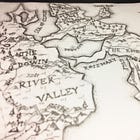Chapter 13: Philemon
“They were not created from the beginning,” he said. “They were perverted.”
If this is your first time here, welcome aboard⚓️! Let’s start from Chapter 1:
Becoming an annual paid subscriber (ONLY 3.32/mo.) to Alice by the Palm will get you a 6-month paid subscription to this novel:
*
*
*
Places mentioned:
Castle Katella
A self-sufficient, city-like castle where the King and the Queen and the unmarried Valrinos live.
Spring
The capital city of Tyrannoson.
Dewy Eye:
A calm but dangerous sea surrounded by three continents. No ship has ever crossed it.
Sanlostier:
The forbidden forest that seems to be ruled by a certain subspecies of Elves.
Mertie:
Ivan's hometown, a rural village.
*
*
Creatures (that can speak and have names) mentioned:
Yisreal Valrino
A son of the King. Leopoldo met the young Yisreal in the woods while hunting. Then the King brought him back to Castle Katella and announced him to be his son.
Nicholas Valrino
The youngest son of the Queen.
Carwen Valrino
The youngest child and the only daughter of King Leopoldo and Queen Evelyn.
Meredith
A mysterious murderess—presumably a mermaid—entrusted to Ivan’s custody by Yisreal, who was supposed to execute her.
Mr. Galorde
Ivan’s grandfather’s apprentice, having served both his grandfather and father as their assistant.
Barnet
A fisherman living by the coast of Dewy Eye.
Philemon
An Elf of royal blood, the only son of the Lord of Sanlostier. He released Ivan from the Elves’ dungeon but refused to cross the border to the human world with him.
Phisens
The god of the Elves. He sacrificed himself to prevent a curse from falling upon his creation.
Kimo
Ivan’s servant in the palace. At this point, he was already dead, killed by Meredith.
*
*
*
13
Philemon
Barnet ran to open the fence. I turned around, took a fish spear from him, and rode toward the foothills of the mountain.
The horse was reluctant, but she was emboldened by my resolve. I spoke to her in Elvish as my attention fixed on the distance, where a different scream pierced the silence, followed by another. A spot of fire became a cluster and multiplied. Five or six grown men, each holding a torch and some kind of weapon, were closing in on a child, while two adults—a man and a woman—ran over, yelling with their arms raised. They must have been the boy’s parents.
I saw the boy through the red glow and the moving figures. Yes, he was just like Lucas—a being deprived of life yet still active, preaching death.
I stopped under an oak tree, waiting for the right moment to intervene. A villager first pierced the boy’s shoulder—and the boy’s mother, rather than the boy himself, fell to her knees. The father didn’t try to stop them, as if he knew this was for the good. The boy gripped the spearhead and pulled it out, which frightened the villagers. He jumped at the man who had stabbed him, attempting to bite his face, but I used magic to yank his head back. He hissed and bared his teeth, struggling to break free from my grip. After a few seconds of deadlock, the man threw him off his shoulders.
The boy fell to the ground, and before he could rise, another villager stabbed him in the back. Finally, someone else set him ablaze with a torch.
They stood more loosely around him, letting the fire do its work, but the boy no longer paid attention to them. He turned to me, still enwrapped in flames, his large, empty eyes fixed on me as I sat on my horse beneath the oak tree.
My horse reared up and turned to flee. She wouldn’t listen to me this time, though part of me agreed with her decision to run.
These villagers didn’t know that fire alone wouldn’t kill the boy; they would have to chop off his head. I turned around and was not surprised to see him running after me—a ball of fire rolling down the hill, scorching the grass in its path and leaving a streak of flames across the village behind him.
I didn’t understand. Was this evil being so vengeful that it would give up easier prey—the mortals surrounding it?
I could try to throw the spear at him, but I was no fighter. He ran faster than my horse and grabbed hold of her legs—she tipped over, and I was thrown from her back.
I rolled across the ground for a short distance, clutching the spear, and quickly stood up before the boy could leap at me. I swung the spear to keep him from getting closer. The fire had scorched him into a shadow, leaving only two hollow eyes. He showed no fear, only an aim: to kill me.
I hurled the spear at his neck like throwing a dart. It pierced through his neck, yet the head and body didn’t separate until the spear landed far behind him. As soon as the head hit the ground, the flames surged and voraciously consumed it. The scorched body collapsed moments later, crumbling into ashes that scattered and vanished in the wind. The surrounding trees were now ablaze; branches crackled and fell, igniting the grass below.
But when I shifted my attention back to the burning head, I noticed a fine arrow with a metallic sheen amid the flames. I pulled it out, and my split vision caught a figure in front of me.
I looked up. A man wearing a cloak was crouching on a slender branch on fire, a bow resting by his legs. He leaped off the tree and let out a whistle.
“Who are you?” I asked.
For a moment—perhaps it was the silhouette, the jawline, or something invisible to the carnal eye—I thought of Yisreal.
Just then, I heard my horse galloping back to me.
The man pulled off his hood, and his face emerged into the glow of the flames.
I gaped at the sight of him. It was hard to tell which was brighter—the fire or the life of that face.
“How did you always get into troubles you can’t handle?”
“No, I killed him,” I said.



